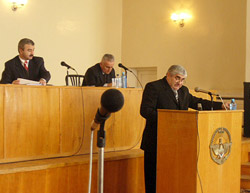The Karabakh government had presented the budget plan to the National Assembly on December 1, after which there have been discussions between members of constant committees of the Karabakh parliament. There were nearly 90 proposals and issues presented to the government on the part of the Karabakh parliament which, according to Minister of Finances and Economy of Karabakh Spartak Tevosyan, mainly referred to the health sector and the water supply system of Stepanakert. However, it turns out that the deputies weren’t satisfied with that because there were still a number of issues not discussed during the session and most of them were raised by the representatives of the “Free Homeland” party.
During the discussion of the budget plan, deputies Valeri Harutyunyan and Gegham Baghdasaryan referred to the issue concerning the provision of the hypothec credit. In his speech, Valeri Harutyunyan said that 400-500 couples get married in Karabakh on a yearly basis and each of the families needs a home, however the 500 million drams foreseen for the hypothec credit by the Karabakh government for 2007 is not even enough for 50 families. He also mentioned that there are numerous families waiting to get homes. In response to the deputy’s question, Minister of Finances and Economy Spartak Tevosyan said that there is a lack of 7 billion drams worth of hypothec credit, but the Karabakh government can’t provide that much at the moment.
Deputy Gegham Baghdasaryan was interested to know why the government hadn’t provided the 200 million dram hypothec credit this year. The minister justified hat by saying that the hypothec credit is new for Karabakh and it was hard to elaborate the rules and regulations for providing the credit and come to terms with the banks. “Is there any guarantee that the same thing won’t happen next year?” In response to this, the minister said: “You can rest assured.”
Leader of the “Free Homeland” party and the “Homeland” faction Arayik Harutyunyan raised the issue concerning the construction of the new parliament building. According to the budget plan, 237 million drams has been spent for the construction of the building in 2006 and it is foreseen to spend another 398 million drams in 2007. (As a matter of fact, the building has already been erected and the only thing left is the interior). The deputy wanted to know how the government plans to spend the remaining 400 million drams. The response of Finance and Economy Minister of Karabakh Spartak Tevosyan was impressive. It turns out that the money provided for 2006 was not enough to end the construction and the government asked for loans from sponsors to complete the job.
“We have to be grateful for the sponsors who helped construct the building,” said Mr. Tevosyan.
The money has already been spent and now the Karabakh government is adding more money in order to “pay back the loans”. During the session, it wasn’t mentioned why the expenses were more than expected, why one part of the building was constructed a couple of times and from whom the government was forced to ask for money for the construction of the Karabakh parliament building.
Leader of the “Democracy” faction Vahram Atanesyan stayed neutral concerning the budget plan. “The reason the government is doing this is because it went along with some calls for populism that some of our National Assembly colleagues are making. As a result we have a budget where 58% of the expenses are for salaries, pensions, subsidies or this or that kind of social aid. In other words, in 2007, more than 17 billion drams of the Karabakh state budget will be spent on things that won’t affect the economy. If we add another 7.5 billion for capital construction, which also isn’t going to help the economy, it turns out that 70% of the budget is consumed. Karabakh is starting to become a consumer country starting from 2006; however that’s not the path to take. We have to think about having a self-sufficient Karabakh, which tries to have an economy that covers all the expenses and solves social issues,” mentioned V. Atanesyan.
In his opinion, it’s time for the government to review its taxing policy. “I mean that the taxing liberalization that Karabakh authorized during the years 2000-2005 must have shown effectiveness; if it doesn’t, we have to take control of taxing. If 70% of the budget is consumed, 25-30 big businesses are going to be funded and the citizens will see the effectiveness after a couple of years, I don’t really think that a bright future awaits Karabakh’s economic development.
V. Atanesyan also believes that Karabakh’s economy is vulnerable and unprotected from foreign influences. “We must have an independent economy, just like we have an independent country,” he says.
By our request, leader of the “Homeland” faction Arayik Harutyunyan also expressed his opinion regarding the budget plan and mentioned that there is progress in the raising of salaries, subsidies, etc., as well as the broadening of capital construction projects, “however, we believe that there are main issues, which can be solved but haven’t been included in the budget plan.”
December 20 marked the first reading of the budget plan and the second reading is foreseen to take place on December 27. Only then will the opinions of the parliamentary factions be clear. In fact, during the session, the Minister of Finances and Economy of Karabakh mentioned that the structure and body of the Karabakh government is going to change after the constitutional amendments.

